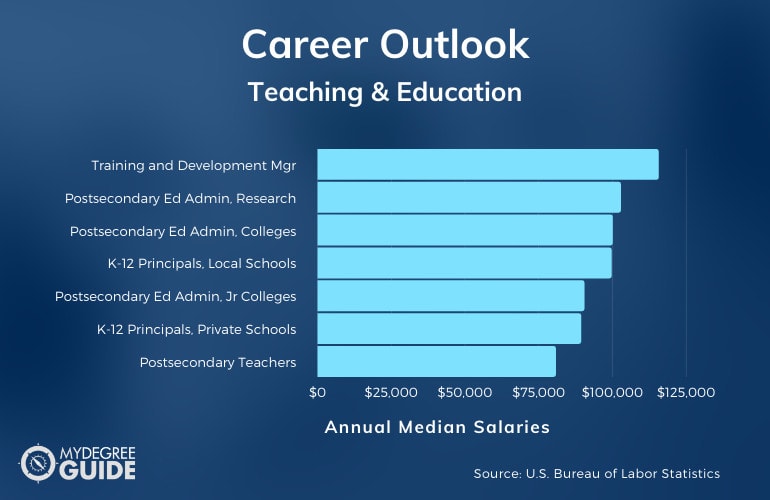An online PhD in Teaching allows you the opportunity to develop your expertise in the education industry.

A PhD program can help put you on the path toward pursuing senior leadership positions in academia. In addition, PhD graduates often qualify for careers in research as well as postsecondary teaching.
Editorial Listing ShortCode:
By pursuing a Ph.D in Education online, you can receive advanced training for this impactful and rewarding field.
Universities Offering Online PhD in Teaching Degree Programs
Methodology: The following school list is in alphabetical order. To be included, a college or university must be regionally accredited and offer degree programs online or in a hybrid format.
Ball State University
Ball State University offers a PhD in Educational Studies. Students may choose between 3 specializations: Curriculum, Educational Technology, or Cultural and Educational Policy.
The program requires 91 credits to graduate. Applicants must have a master’s degree with a minimum GPA of 3.2 and should submit GRE scores, 3 letters of recommendation, and a statement of purpose.
Ball State is accredited by the Higher Learning Commission.
Capella University
Capella University offers a PhD in Education with 5 specializations, including Special Education Leadership and Leadership for Higher Education. The requirements to graduate differ for each specialization. Some require internships, while others require dissertations. Applicants must have a master’s degree with a minimum GPA of 3.0.
Capella also offers an online EdD in Curriculum and Instruction.
Capella University is accredited by the Higher Learning Commission.
Colorado State University
Colorado State University offers a PhD in Education and Human Resources with a Higher Education Leadership specialization.
Students must complete 60 credits, 2 comprehensive exams, and a dissertation and have a juried publication or presentation to graduate. Applicants must have a master’s degree with a GPA of 3.0 or higher and 2 years of relevant work experience.
Colorado State is accredited by The Higher Learning Commission.
Columbia International University
Columbia International University offers a Doctor of Philosophy in Educational Leadership. The program requires 60 credits to graduate and can usually be finished within 4 years. Applicants must have a minimum GPA of 3.2 and need to submit 2 references, a letter of evaluation, and an academic writing sample.
CIU is accredited by the Commission on Colleges of the Southern Association of Colleges and Schools.
Concordia University – Chicago
Concordia University—Chicago offers online education degree programs leading to a PhD. Options include a Principal Preparation program and an Educational Leadership program.
Each program can typically be completed in 4 years, with 61 to 67 credits required to graduate. Applicants must have a master’s degree with a minimum GPA of 3.0, GRE scores, and 2 years of teaching experience.
Concordia University Chicago is accredited by the Higher Learning Commission.
Indiana State University
Indiana State University offers an online program for a PhD in Educational Administration with a specialization in Higher Education Leadership.
To graduate, students must complete 63 credit hours, including 18 dedicated towards a dissertation. Applicants must have a master’s degree with a grade of B+ or higher. Official transcripts, GRE scores, and 3 letters of recommendation must be submitted when applying.
Indiana State University is accredited by the Higher Learning Commission.
Johns Hopkins University
John Hopkins University offers an online Doctor of Education program. The program is completed part-time and usually takes 3 to 7 years to finish. A total of 90 credits are needed to graduate. Applicants must have a master’s degree with a minimum GPA of 3.0, a personal statement, and 3 letters of recommendation.
Johns Hopkins University is accredited by the Middle States Commission on Higher Education.
Liberty University
Liberty University offers an online PhD in Education program. Students may choose to add one of 5 specializations to their degree, including Educational Law or Curriculum and Instruction. Each course lasts for 8 weeks. Applicants must have a GPA of 3.0 or higher and need to submit all official college transcripts to be eligible for the program.
Liberty University is accredited by the Southern Association of Colleges and Schools Commission on Colleges.
National University
National University offers a Doctor of Philosophy in Education. Students must obtain 60 credit hours to graduate.
The program can be started at any time and usually takes 37 months to complete. Those interested in the program must complete an online application and submit official transcripts from all previously attended post-secondary institutions.
National University is accredited by the WASC Senior College and University Commission.
Northwest Nazarene University
Northwest Nazarene University offers an online program for a Doctor of Philosophy in Educational Leadership.
Students must complete 41 credits, which can be added to 30 obtained from a qualifying Ed.S degree, to graduate. Applicants must have an Ed.S degree with a GPA of 3.5 or higher. An interview with the doctoral program director and 2 references are also required.
NNU is accredited by the Northwest Commission on Colleges and Universities.
Notre Dame of Maryland University
Notre Dame of Maryland University offers a PhD in Higher Education Leadership for Changing Populations. Students must complete 51 credits, including 12 dedicated to a dissertation, to graduate. Applicants must complete an online application and provide official transcripts, 2 letters of recommendation, a personal statement, and GRE scores.
Notre Dame of Maryland University is accredited by the Middle States Commission on Higher Education.
Old Dominion University
Old Dominion University offers an online PhD in Educational Leadership program. Students must complete 33 credit hours and 120 internship hours to graduate.
Applicants must be currently employed by a school district and have 3 years of experience to be eligible for the program. Official transcripts, an essay, and 3 references must be submitted when applying.
Old Dominion University is accredited by the Southern Association of Colleges and Schools Commission on Colleges.
Regent University
Regent University offers an online PhD in Education program. It requires students to complete 67 credit hours and a dissertation to graduate. Students may choose one of 11 different concentrations to add to the degree, including Adult Education and Educational Psychology. Applicants must submit an academic writing sample and transcripts.
Regent University is accredited by the Southern Association of Colleges and Schools Commission on Colleges.
Texas Tech University
Texas Tech University offers an online program for a Doctor of Philosophy in Curriculum and Instruction. Applicants must submit transcripts and test scores to be eligible for the program.
Specializations that can be pursued in this program include Curriculum Studies and Teacher Education, Language, Diversity, and Literacy Studies, and STEM. Each specialization requires students to obtain 63 credit hours to graduate.
Texas Tech University is accredited by the Southern Association of Colleges and Schools Commission on Colleges.
University of Arizona
The University of Arizona offers an online Doctorate in Education program. To graduate, students must complete 59 credits, with 11 dedicated to either a capstone project or dissertation, and have a GPA of 3.0 or higher. Courses last for 6 to 9 weeks. Applicants must have a master’s degree with a minimum GPA of 3.0.
The University of Arizona is accredited by the Higher Learning Commission.
University of Arkansas
The University of Arkansas offers an online program for a Doctor of Education in Educational Leadership.
The program requires the completion of 42 credit hours and a dissertation and can usually be completed in 3 years. Classes are held in cohorts. Applicants must submit official transcripts, a writing sample, 3 letters of recommendation, and a copy of their teaching or administrator’s license.
The University of Arkansas is accredited by the Higher Learning Commission.
University of Idaho
The University of Idaho offers a Doctor of Education and a Doctor of Philosophy in Curriculum and Instruction. Students may choose to add one of nine specializations to their degree, including Exercise Science or Career and Technical Education. Applicants must have a GPA of 3.0 or higher, 3 letters of recommendation, and a writing sample.
The University of Idaho is accredited by the Northwest Commission on Colleges and Universities.
University of Nebraska
The University of Nebraska offers an online PhD in Educational Studies program. Students must complete 108 credits, including the credits earned from a master’s degree.
At least 45 semester hours must be obtained from the University of Nebraska. Applicants must have a master’s degree with a minimum GPA of 3.0, GRE scores, and 3 letters or recommendation.
The University of Nebraska is accredited by the Higher Learning Commission.
University of Toledo
The University of Toledo offers an online program for a PhD in Curriculum and Instruction with a specialization in Special Education.
Students must complete 60 credit hours and an internship to graduate. Applicants must have a master’s degree with a minimum GPA of 3.25 in previous graduate work, 3 letters of recommendation, and 2 years of teaching experience.
The University of Toledo is accredited by the Higher Learning Commission.
Walden University
Walden University offers an online program for a PhD in Education with 11 different specializations. Specialization options include Early Childhood Special Education and Reading, Literacy, Assessment, and Evaluation.
Up to 45 qualifying credits can be transferred into the program from other schools, work experience, or examinations. Applicants must submit an online application with official transcripts and previous employment history.
Walden is accredited by The Higher Learning Commission.
Online PhD in Teaching Programs

An online PhD in Education can open up opportunities for senior leadership positions in academia. A PhD degree path focuses primarily on research.
Leadership roles in academia include:
- College president
- Professor
- Chief learning officer
- Senior academic administrator
- Academic dean
Though courses vary from school to school, you’ll likely find yourself learning about the following topics:
- Educational pedagogy
- Leadership in education
- Advanced educational psychology
- Advanced curriculum study
You may also find yourself immersed in research projects. These projects are catered to your concerns or interests in the educational industry, demonstrating your commitment to positive change. Many programs also require examinations or dissertations. It’s strategic to look at the program requirements for each school that interests you.
If you wish to advance your teaching career or use your educational experience in a meaningful way, an online doctorate in education offers meaningful coursework to enhance your training and skill set.
Specializations

When pursuing an online PhD in Education, you have the opportunity to focus on a specialization that best aligns with your interests and career goals. Here are some common specializations:
- Higher Education Leadership: This specializations helps you develop the necessary skills to take on administrative roles in higher education and in government institutions.
- Curriculum and Instruction: This specialization focuses on the research, development, and implementation of impactful curriculum changes. By studying statistics of student achievement and recognizing where gaps need to be filled, you may impact curriculum development.
- Organizational Leadership: This specialization helps prepare you for leadership roles within an educational institution. You can learn how to prepare strategic development ideas for your organization and also how to aid in employees’ professional development.
- Special Education: This specialization focuses on the individual needs of a unique population of an educational organization. You can learn to create accommodating environments and instruction for these high-need students, and you can learn to better understand students’ differences, disabilities, and gifts.
- K-12 Education: With a focus on primary and secondary education, a K-12 education specialization allows you to advance your leadership and administrative skills in order to oversee educational institutions.
These specializations are extremely diverse. Your previous educational experience and long-term professional goals can help you determine which path is best for you.
Teaching & Education Careers & Salaries

Ph.D programs in education can lead to a vast range of career paths, depending on your interests and long-term goals. What degree you need to be a teacher at the K-12 level is a bachelor’s, earning a PhD can help you qualify for positions in research and postsecondary institutions as well.
According to the Bureau of Labor Statistics, employment for education, training, and library occupations is projected to grow 5% in the next ten years.
| Careers | Annual Median Salaries |
| Training and Development Managers | $115,640 |
| Postsecondary Education Administrators, Scientific Research and Development Services | $102,840 |
| Postsecondary Education Administrators, Colleges, Universities, and Professional Schools | $100,060 |
| K-12 Principals, Local Schools | $99,690 |
| Postsecondary Education Administrators, Junior Colleges | $90,470 |
| K-12 Principals, Private Schools | $89,350 |
| Postsecondary Teachers | $80,790 |
| Junior College Education Teachers | $69,730 |
| Instructional Coordinators | $66,970 |
| Postsecondary Education Teachers | $65,440 |
The majority of these roles require extensive research and administrative skills. Many of these careers can be found in postsecondary or government educational institutions. In regards to the salary for postsecondary teachers, the average pay can vary depending on the subject taught.
How to Choose an Online Doctoral Program in Education

Here are a few factors you may consider when you’re selecting which online doctoral programs to pursue:
- Program length. Perhaps you have a few years to dedicate to this program, or maybe you wish to finish more quickly in order to advance your career. This is a factor to look into when making your selection.
- Your schedule. Do you have the time available to dedicate yourself to a full-time course load? Perhaps you wish to continue working while you take a part-time course load. It’s helpful to select a program that adapts to your life.
- Specialization focus. Do your prospective schools offer the specialization that aligns with your career goals?
- Accreditation. It’s important for a program to be from an accredited institution.
- Credit transfers. Schools can have varying credit transfer policies. Enrolling in a program that allows you to transfer your credits may be beneficial in the long run.
In addition, it’s strategic to check admission requirements to ensure that you meet or exceed the basic requirements of your potential school. You can also inquire as to whether an internship or residency placement can work toward your course credits.
Education Doctorate Curriculum

The degree specialization you choose can radically change the courses you find yourself in. Here are a few basic courses you may encounter when pursuing doctorate degrees in education:
- Educational Pedagogy: This course is the study of all the different aspects of teaching and teaching methods. You reflect on teaching, consider how it is constructed, collaborate to improve it, and develop plans to integrate these new methods.
- Leadership in Education: You’ll learn the necessary skills and characteristics for management roles in educational institutions. You’ll research leadership in the context of education and learn the necessary skills to implement toward the development of schools.
- Advanced Educational Psychology: This course focuses on the analysis of classroom strategies used to help students succeed. It looks at psychological theories and learning research and seeks to use inquiry-based practice to solve instructional and administrative problems.
- Advanced Curriculum Study: Looking at the principles of curriculum development and implementation, you’ll learn to research and study data on how to improve curriculum for student success. This course also seeks to help you better understand how to administer curriculum and program design improvements to your professional team.
- Gifted and Special Education: Looking at the needs and differentiation required by students in a high-needs population, you’ll develop the necessary skills to become leaders in the special education department.
- Teaching Adult Populations: Teaching students of the adult population differs in both planning and approach. If you wish to pursue professor roles in postsecondary institutions, the skills and management learned in this course can be beneficial.
- Advanced Educational Research Practices: In order to become highly skilled in research specific to the education industry, you’ll learn the foundational basics for studying data, analyzing statistics, and conducting effective studies.
- Problems and Issues in Education: This is a beginner’s course to help you understand the basic needs and struggles of both curriculum and teaching in all educational industries. You’ll learn the necessary methods to formulate questions and inquiry-based studies to help improve education.
- Instruction Technology and Methodology: You’ll learn how to implement and facilitate technology-based teaching to enrich the learning experience. There is a focus on how to modernize and improve education through technology as well.
- Administration: If you’re looking to take on a leadership or administration role, you may benefit from the management skills and organizational strategies developed through this course.
This is only a sample of what courses you may encounter as you pursue your degree. Most PhD programs also include a dissertation requirement.
Admissions Requirements

Schools that offer an online PhD in Teaching program can have varying admission requirements. It’s beneficial to look into each of your prospective school’s requirements. Here are some common criteria you may encounter when you’re looking to apply:
- Bachelor and masters degree in a relevant subject, or completion of combined masters and teaching credential programs
- Official college transcripts
- Resume or CV
- Letter of intent
Some schools may request a GME or GMAT score for graduate admissions, but a number of schools no longer require this in their admissions process.
Accreditation

Regional accreditation of a school and program is an essential factor to look for. Regional accreditation ensures that the school is up to educational standards and that your degree will be recognized across the United States.
Accreditation is often a requirement for credits to be eligible for transfer as well. A school’s accreditation status affirms that its standards are of high academic quality and accountability, according to the expectations established by the Council for Higher Education Accreditation (CHEA).
You can also check CHEA’s database of accredited institutions to make sure that the school you’re interested in is listed.
Financial Aid and Scholarships

Most students who pursue an online PhD in Teaching already have experience in the education industry. If you’ll be looking for financial aid for your doctoral journey, you may want to start by asking your organization if they offer sabbaticals or scholarships.
There are also numerous scholarships available for students pursuing degrees in education, so you may be able to find and apply to these scholarships if you qualify.
Filling out the Free Application for Federal Student Aid (FAFSA) is another place to start when seeking financial aid. Some schools set deadlines for how long they’ll accept FAFSA applications, so it’s necessary to apply prior to this deadline. The FAFSA determines your eligibility for financial aid provided by the federal and state governments.
Education Professional Organizations

Professional organizations are not mandatory, but they can offer you unique professional support and numerous professional growth opportunities.
Here are a few education professional organizations you may want to consider joining:
- American Association of School Administrators (AASA)
- Association for Supervision and Curriculum Development (ASCD)
- National Education Association (NEA)
A professional organization allows you to be part of a connected support network, to have access to free resources, and to be informed about conferences and workshops that can benefit your growth in the industry.
What Is an EdD?

Doctor of Education (EdD) is a professional degree for those looking to take on leadership roles in the education industry. This type of degree is catered for experienced educators who are looking to find career growth or make impactful change in their organization.
An Ed.D. is primarily practice-based and involves collecting and analyzing data in order to implement new strategies in K-12 organizations. It’s a strategic path for educators seeking administrative roles in student and organizational success.
What Is a PhD in Education?

A PhD in Education is a degree that helps qualify you to pursue a role in academia and research at a postsecondary level.
It’s a very research-heavy, theoretical-based program that helps equip students to become leaders in the education industry. The work or research a PhD graduate does may impact the work an EdD graduate implements in their administrative role.
A PhD in Education is strategic if you want to work in academia as a postsecondary professor and pursue tenure. A PhD is also beneficial if you want to focus on research.
What Can You Do with a PhD in Teaching?

There are numerous roles in academia, research, or administration that you may pursue with a PhD in Teaching.
Common careers in this field include postsecondary professor, postsecondary or senior academic administrator, chief learning officer, college president, academic dean, and educational research analyst.
Academic dean positions may be limited per institution, but administrators, professors, and learning officers continue to be needed as more students enter universities and postsecondary institutions.
How Long Does It Take to Get a PhD in Teaching?
A PhD generally takes 3 to 5 years to complete. The length of a program can depend on the number of credit hours required as well as how long it takes you to complete your dissertation.
If no dissertation is required, a doctoral program can generally be completed in 3 years with full-time study. If you take a part-time course load or work while pursuing your degree, you can expect your timeframe to be extended.
How Much Does It Cost to Get a PhD in Teaching?

Although tuition varies, you can expect to pay between $350 to $800 per credit hour when pursuing a teaching PhD.
A typical program requires around 90 credits, which means that tuition may range from $31,500 to over $72,000, depending on the school and program requirements. There are also additional fees to consider, such as textbooks, workshops, conferences, or additional certification programs that you may encounter while pursuing your degree.
What’s the Difference Between a PhD vs. Doctorate in Education?
Though they are both doctoral degrees, there are a few differences between a PhD and a professional doctorate in education.
| Doctor of Education | PhD in Education |
|
|
It can help to think of your long-term career goals when deciding between online doctoral degrees in education.
What’s the Difference Between an EdD vs. PhD in Education?
There are quite a few key differences between a Doctor of Education (EdD) and a Doctor of Philosophy (PhD) in Education.
| EdD | PhD in Education |
|
|
Time and cost can be important factors to consider when deciding between these two degrees.
Is a PhD in Teaching Worth It?
Yes, a PhD in Teaching is worth it for many professionals. This terminal degree may lead to impactful work in the industry of education. It can help you develop the necessary skills to obtain work in research as well as academia. Graduates tend to go on to become teachers or administrators in the education field.
The Bureau of Labor Statistics projects 5% job growth for education, training, and library occupations. Employment for those working in postsecondary education administration is expected to grow 4%. Postsecondary teachers are expected to experience 9% job growth.
Getting Your PhD in Teaching Online

If you wish to be immersed in the research that helps define changes in education on a national level, then you may want to consider getting your PhD in Teaching online.
Many online teaching degree programs , including both online doctorate and online masters programs in teaching, offer you the flexibility to work around your schedule and lifestyle while you advance your skill set and work toward your career goals in academia.
With your advanced training, you may find yourself taking part in the future of education. If you’re ready to begin your terminal degree, you can start by comparing accredited online doctoral teaching programs to find the one that best suits your schedule and professional goals.
